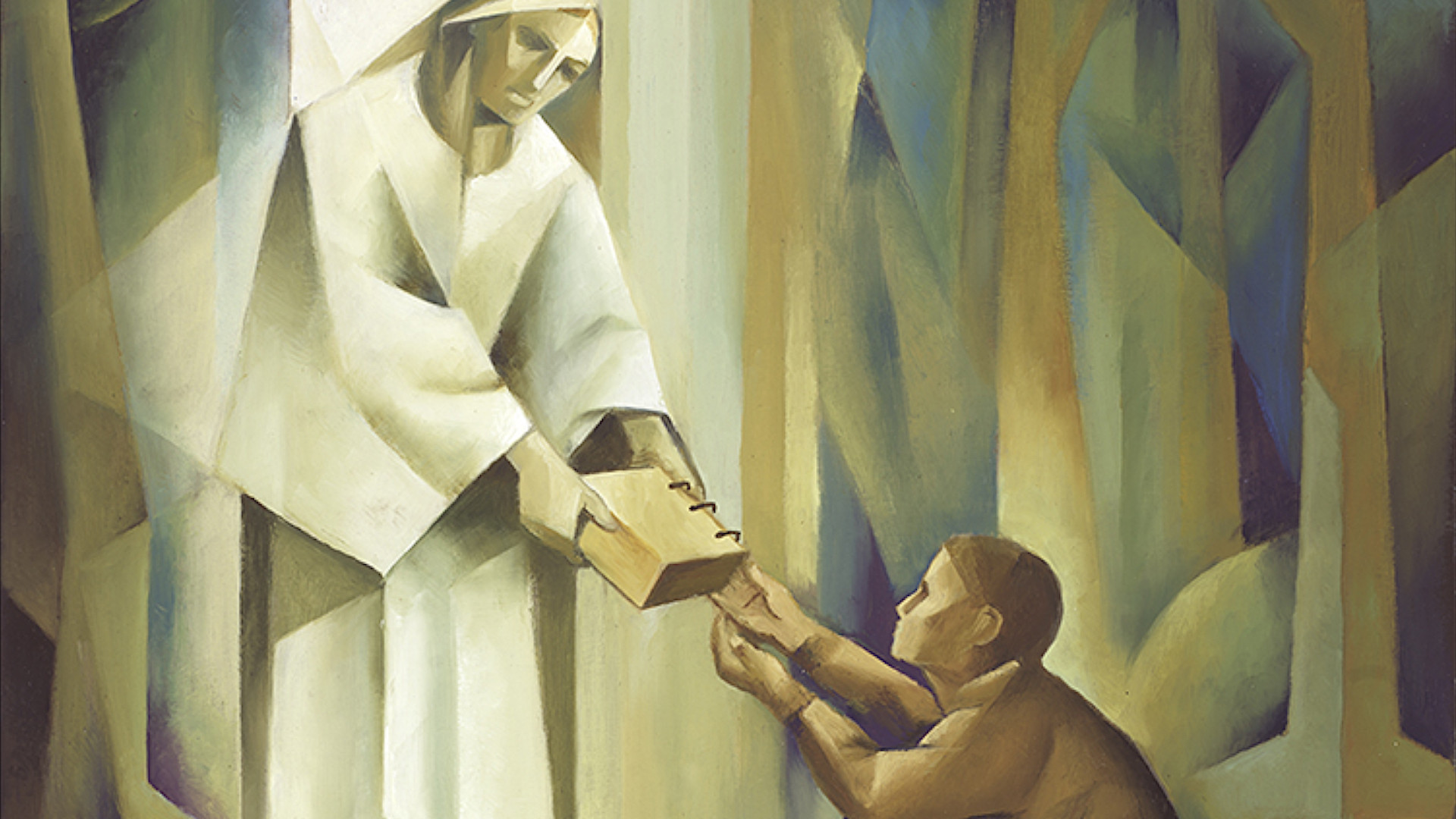You are here
How Did the Angel Moroni Prepare Joseph Smith to Be a Prophet?

Joseph Smith—History 1:54
The Know
In September 1823, the seventeen-year-old Joseph Smith was visited by an angel named Moroni who informed the young Joseph that “there was a book deposited, written upon gold plates, giving an account of the former inhabitants of this continent, and the source from whence they sprang. He also said that the fulness of the everlasting Gospel was contained in it, as delivered by the Savior to the ancient inhabitants” (Joseph Smith—History 1:34). Throughout the course of the night, Moroni continued to instruct Joseph Smith regarding this record, now known as the Book of Mormon. Moroni also told Joseph many things that prepared him for his future work as a prophet of God.
Moroni’s instructions did not end that first night. After Joseph arrived at the hill where the plates were buried, he was informed that “the time for bringing them forth had not yet arrived, neither would it, until four years from that time; but he told me that I should come to that place precisely in one year from that time, and that he would there meet with me, and that I should continue to do so until the time should come for obtaining the plates.” Thus, Joseph went to this hill on September 21, 1824, 1825, 1826 and 1827. On each of those annual occasions, Joseph “received instruction and intelligence from [Moroni] at each of our interviews,” not only about the Book of Mormon but also “respecting what the Lord was going to do, and how and in what manner his kingdom was to be conducted in the last days” (Joseph Smith—History 1:53–54).
While we do not know the full details of the “instruction and intelligence” Moroni shared with Joseph, it is clear that whatever Joseph learned, it shaped his prophetic career in many ways during his fifteen-year ministry from 1829 to 1844. After examining many of the existing accounts of the coming forth of the Book of Mormon, LeGrand L. Baker has observed that several principles appear to have been taught to Joseph by Moroni during these annual visits. Consider the following three.
1. Keep Sacred Things Sacred
One principle impressed upon the young prophet’s mind was that one does not speak too openly about sacred things. While this principle had previously been taught to Joseph through his First Vision, “Moroni would re-enforce that principle when he explained that Joseph must show the plates to no one until he had permission to do so.”1 This had clearly been a lesson that caused Joseph to be hesitant to share his experience with his father despite Moroni’s instructions to “tell your father of this for he will believe every word you say.”2 Between this time and the time the Book of Mormon was published, Joseph was careful not to show anyone the plates, intent on keeping this sacred principle.
2. Recognize the Promptings of the Holy Spirit
Another principle Joseph Smith learned during this time was how to recognize the promptings of the Holy Spirit in contrast to the temptations of the devil. On Moroni’s third visit to Joseph on the first night, he “added a caution to me, telling me that Satan would try to tempt me (in consequence of the indigent circumstances of my father’s family), to get the plates for the purpose of getting rich.” The only way Joseph could receive the record, however, was if he were to overcome this temptation and “have no other object in view in getting the plates but to glorify God, and . . . not be influenced by any other motive than that of building his kingdom” (Joseph Smith—History 1:46).
When Joseph arrived at the hill, as Oliver Cowdery would later report, he began to wonder about the worth of the plates and the possibility of possessing enough treasure to finally free his family from poverty. Because of this, Joseph was prevented from touching the gold plates.3 The angel Moroni again appeared and showed Joseph a vision. Joseph “beheld the Prince of Darkness, surrounded by his innumerable train of associates. All this passed before him, and the heavenly messenger said, ‘All this is shown, the good and the evil, the holy and impure, the glory of God, and the power of darkness, that you may know hereafter the two powers, and never be influenced or overcome by that wicked one.’”4
Although aspects of this account may have been embellished by Oliver Cowdery, this event would have undoubtedly been formative for the young prophet.5 Even though Joseph desired a good thing—that is, helping his struggling family—Joseph learned just how subtle Satan could be. Because Joseph learned this, he also learned how to recognize the opposite: “The Holy Ghost can be trusted all the time, whereas one’s emotions cannot.”6
3. Integrity through Covenant Keeping
A third key principle was taught the following year—namely, that integrity is found in keeping one’s covenants with the Lord. During one of his visits, Moroni told Joseph Smith that he was allowed to then take the plates to his house. Moroni instructed Joseph, “You must take them into your hands and go straight to the house without delay” and immediately lock them in a secure place. After promising to do so, Joseph was about to leave with the plates in his hands when he thought of the other items in the box. Wanting to take care of these other sacred items, Joseph “laid the record down in order to cover up the box least some one should come along and take away whatever else might be deposited there.”7
However, when Joseph turned to pick the plates up a second time, he realized they had vanished. After praying, Moroni appeared and informed Joseph that he had taken the record because Joseph “had not done as he was commanded in that he laid down the record.”8 Even though Joseph again had good intentions, he learned that it is always best to obey the Lord and be true to one’s covenants with Him. Just as the Lord secured the plates in this instance, He could have secured the other items without causing Joseph to break his promise.9
The Why
As Joseph met with Moroni over the next four years, he learned many important lessons. LeGrand Baker has specifically outlined seven principles Joseph learned during these meetings.10 Knowing the importance of the work Joseph was called to do, both the Lord and the angel Moroni worked hard to ensure that Joseph learned all the lessons he needed in order to translate the Book of Mormon. Joseph was obedient and diligent as he received these annual tutorials. He succeeded because he took these instructions seriously.
While many readers of Latter-day Saint history may focus on the initial visit of Moroni in 1823 and Joseph’s retrieval of the plates in 1827, it is clear that all of Moroni’s visits were formative for Joseph Smith. In this process, Joseph learned the principle of continuing revelation—that God reveals line upon line, precept upon precept. Blessed with God’s abundance, Joseph learned to seek to receive the fullness of the everlasting gospel of Jesus Christ. This allowed him to learn additional principles.
All the events Joseph experienced between 1823 and the coming forth of the Book of Mormon in 1830 were given to him, in the wisdom of the Lord, in order to train and nurture him as a growing and maturing prophet of the Lord. As Baker observed,
[Joseph] had learned from Moroni how to obey and how to know what to obey. He had learned the meaning and triumph of sacrifice. Then the Holy Ghost opened to his understanding the true meaning of the mysteries of the fullness of the gospel as recorded in the Book of Mormon. As a result, Joseph now had the power to commit all that he had and all that he was to the establishment and growth of the kingdom of God.11
Through these experiences, Moroni not only taught Joseph how to be a prophet of God but also gave every faithful person a master class on how to receive personal revelation and magnify the callings that our loving Heavenly Father extends to all His faithful children here in this mortal existence.
Further Reading
LeGrand L. Baker, Joseph and Moroni: The 7 Principles Moroni Taught Joseph Smith (Salt Lake City, UT: Eborn Books, 2006).
Richard E. Bennet, School of the Prophet: Joseph Smith’s Learns the First Principles, 1820–1830 (Salt Lake City, UT: Deseret Book, 2010).
Saints: The Story of the Church of Jesus Christ in the Latter Days, vol. 1, The Standard of Truth (Salt Lake City, UT: The Church of Jesus Christ of Latter-day Saints, 2018), 20–42.
- 1. LeGrand L. Baker, Joseph and Moroni: The 7 Principles Moroni Taught Joseph Smith (Salt Lake City: Eborn Books, 2006), 14. See pages 3–14 for a more complete discussion on how Joseph had learned this principle in his First Vision as well. Thanks to the generosity and work of many people, this full publication is available for free in the online Scripture Central Library.
- 2. “Lucy Mack Smith, History, 1844–1845, Page [11], bk. 3,” p. [11], bk. 3 The Joseph Smith Papers.
- 3. See Oliver Cowdery, “Letter VIII,” LDS Messenger and Advocate, Oct. 1835, 2:195–97; this letter is also available online at the Book of Mormon Central Archive. See also Saints: The Story of the Church of Jesus Christ in the Latter Days, 4 vols. (Salt Lake City, UT: The Church of Jesus Christ of Latter-day Saints, 2018), 1:25–27.
- 4. “Appendix: Orson Pratt, A[n] Interesting Account of Several Remarkable Visions, 1840,” p. 10, The Joseph Smith Papers; Oliver Cowdery, “Letter VIII,” Messenger and Advocate 2, no. 1 (1835): 198; see also “Lucy Mack Smith, History, 1844–1845, Pages [11] and [12], bk. 3,” pp. [11–12], bk. 3, The Joseph Smith Papers.
- 5. For a discussion on how Oliver Cowdery’s letters regarding the history of Joseph Smith are to be understood, including how Cowdery may have embellished some aspects of these events, see Book of Mormon Central, “How Are Oliver Cowdery’s Messenger and Advocate Letters to Be Understood and Used? (Mormon 6:6),” KnoWhy 453 (July 26, 2018).
- 6. Baker, Joseph and Moroni, 27.
- 7. “Lucy Mack Smith, History, 1844–1845, Page [2], bk. 4,” p. [2], bk. 4, The Joseph Smith Papers.
- 8. “Lucy Mack Smith, History, 1844–1845, Page [2], bk. 4,” p. [2], bk. 4, The Joseph Smith Papers.
- 9. See Baker, Joseph and Moroni, 34–40, for further discussion on this point.
- 10. In addition to the three principles discussed above, Baker specifically points out at least four more: (1) sometimes prophets must make their own decisions, (2) friendships are not as important as keeping God’s commandments, (3) the Lord has already planned for His children’s success, and (4) the Lord provides whatsoever help He understands we need.
- 11. Baker, Joseph and Moroni, 110.
KnoWhy Citation
Related KnoWhys
Subscribe
Get the latest updates on Book of Mormon topics and research for free





